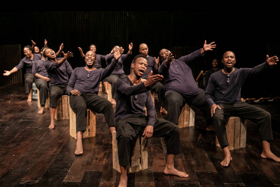Review: SS MENDI: DANCING THE DEATH DRILL, Linbury Theatre, Royal Opera House

![]() I was in my thirties, well educated and reasonably well read, but at Ypres' Menin Gate, I was surprised to see so many Patels, Khans and Singhs etched into the white marble alongside the MacDonalds, Evanses and Smiths. But the First World War was a war of empires - so why should I have been? The short answer is a familiar question in theatres these days: who lives, who dies, who tells your story?
I was in my thirties, well educated and reasonably well read, but at Ypres' Menin Gate, I was surprised to see so many Patels, Khans and Singhs etched into the white marble alongside the MacDonalds, Evanses and Smiths. But the First World War was a war of empires - so why should I have been? The short answer is a familiar question in theatres these days: who lives, who dies, who tells your story?
In 1917, hundreds of black South Africans, members of the South African Native Labour Corps, were drowned after their ship, the SS Mendi, was rammed in fog just off the Isle of Wight, by the cargo ship, the SS Darro.
There were pitifully few lifeboats, which was to be expected, but (as the play contests) many more would have been rescued were these men - en route to dig trenches for the soldiers on the line - not treated, from the moment they signed up, as Untermensch. It was, and is, the greatest maritime disaster in British coastal waters.
British justice did its job, found the master of the SS Darro culpable and sentenced him to... a year of inconvenience, his seafaring license suspended. Apartheid was still three decades in the future - but here was the thinking, the attitudes and the ruthlessness that created that stain on humanity's record.
Isango Ensemble's lament for lost ancestors is, all at once, a celebration of the cultures from which the dead were recruited (pals like the lads in Accrington and Andover) and an indictment of the callous treatment they received. Is also a salutary reminder that those who control historical narratives control contemporary attitudes too - history, whether centuries or days gone by, matters.
There's so much energy on stage - marimbas and drums belting out sea shanties, African music and (I'm sure) a bar or two of Arthur Sullivan's compositions. There's anger too - the loss, or, perhaps, the "before and after", is still keenly felt.
It's the harmonies that touch you most - voices raised as one in sorrow and defiance, the fact that the whole is greater than its parts given artistic truth. One could imagine a Welsh version with miners' choirs, an English version with officers from Oxford's chapels - the sadness somehow sadder as voices weave their collective magic. It's as emotional an evening as one finds in London's theatres.
Isango Ensemble assert two apparently contradictory morals. We are so different, our various cultures' diversity, with roots and branches intertwined but differentiated in outcomes, celebrated as strength, not the axe with which to cleave us. And that we are also exactly the same - the hopes and dreams of all men and women founded on the need to be respected as human beings sharing a brief stay on our blue planet.
Mendi Day (21 February) is the day on which South Africa honours its armed forces - a commemoration not of glorious victory, but of avoidable tragedy. And what better definition of war is there than that?
SS Mendi: Dancing the Death Drill is at the Linbury Theatre, Royal Opera House, until 4 May alternating with Isango Ensemble's A Man of Good Hope.
Photo The Other Richard
Reader Reviews
Videos

